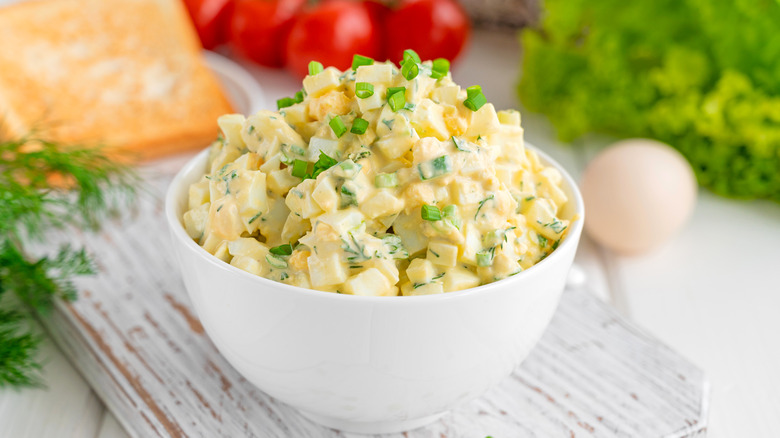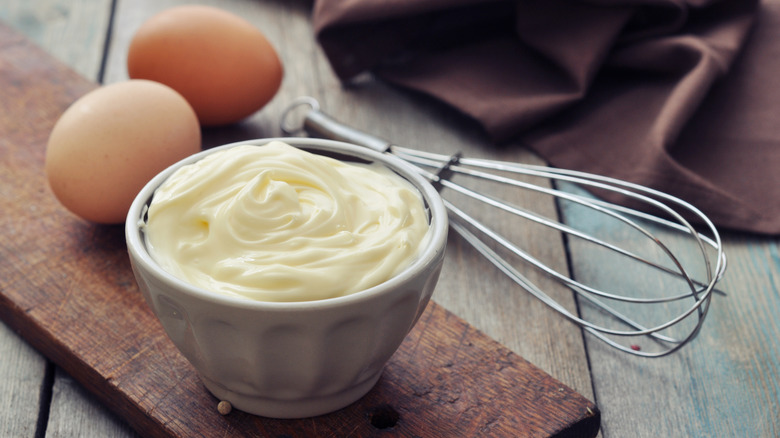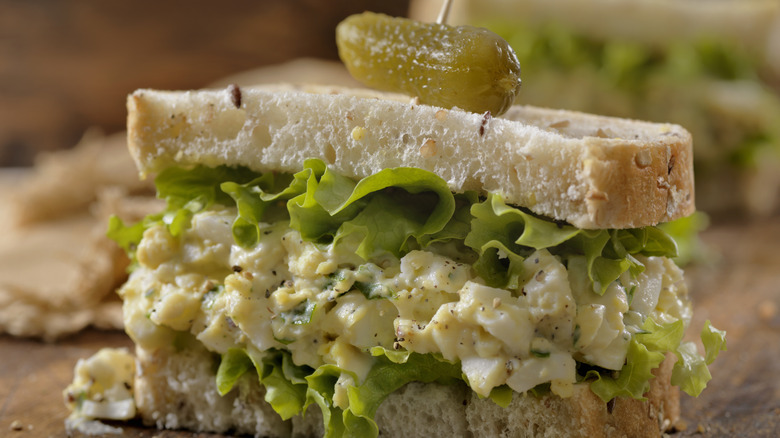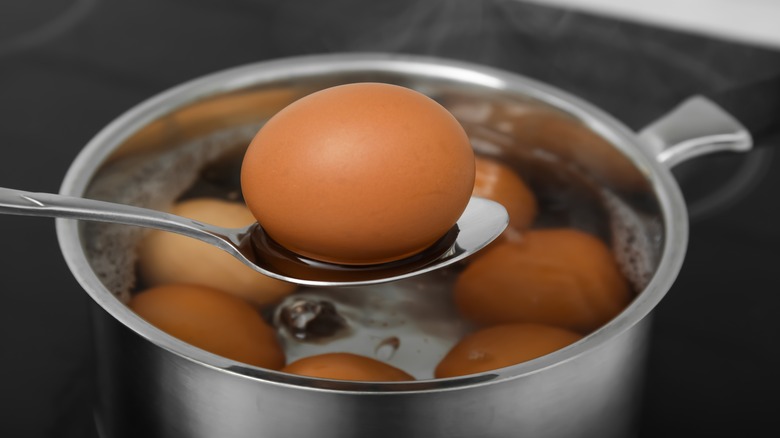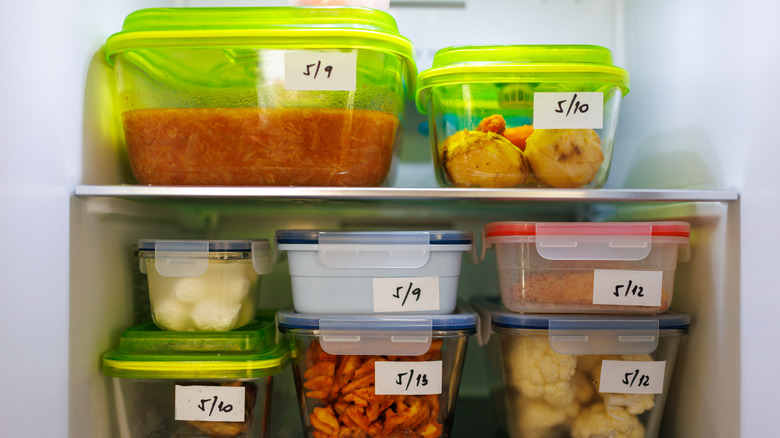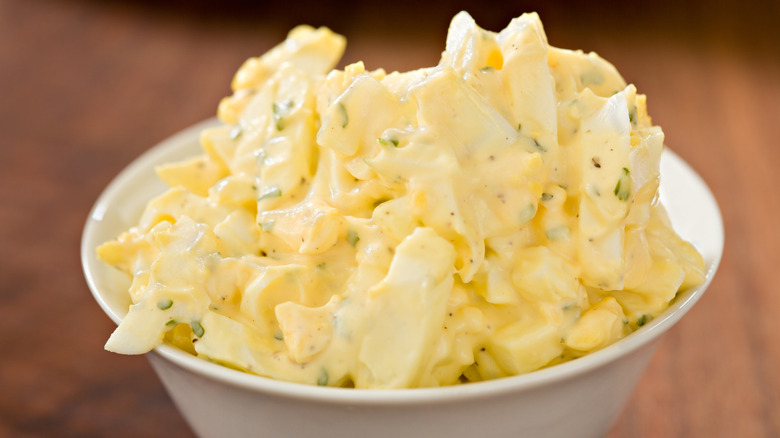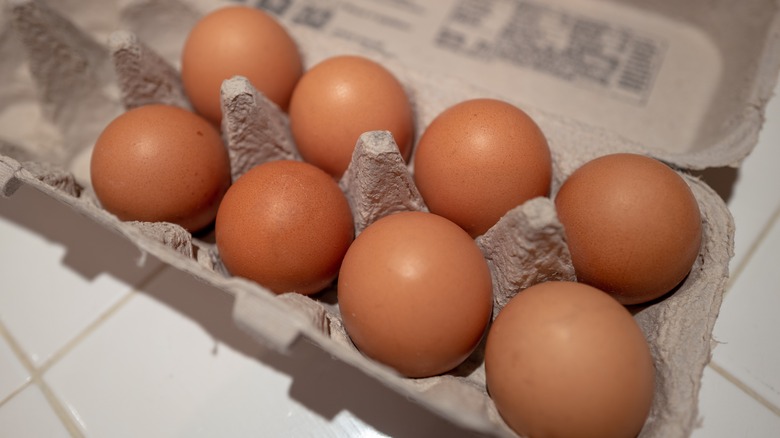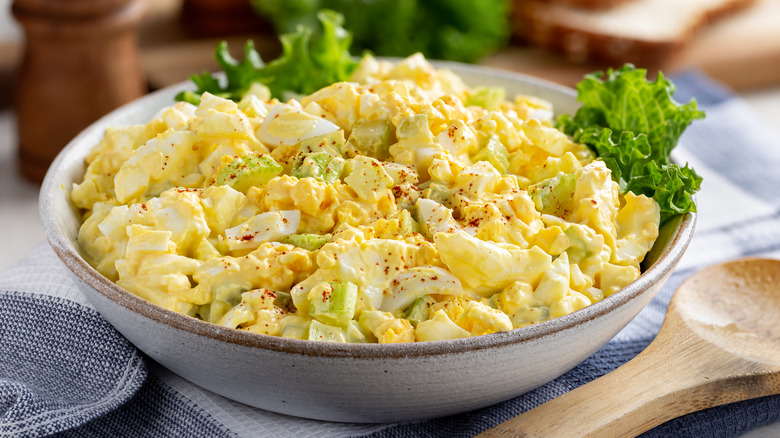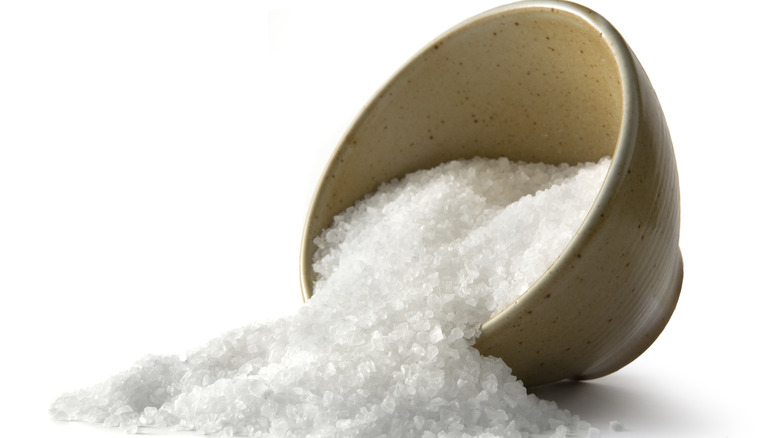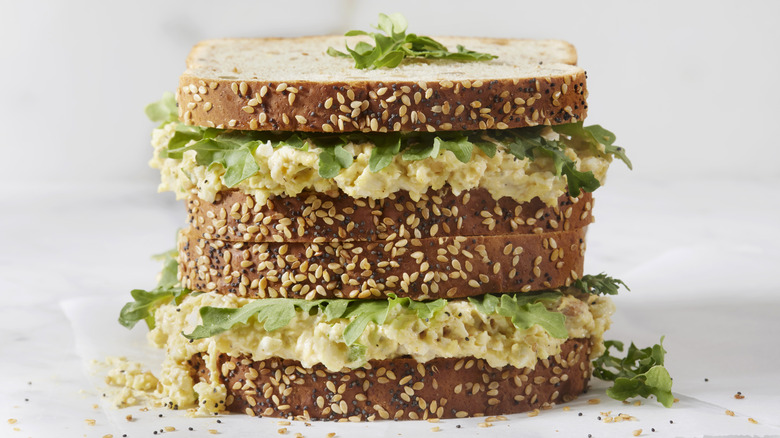What You Need To Know Before You Eat Egg Salad
Are you new to egg salad? Or have you been eating it for years without really thinking about what's inside and what it can do to or for your body? Then you've come to the right place! Before you pick up your next egg salad sandwich (or your first), there are a few things you should know.
This common sandwich filler is oddly divisive. There are some who can't get enough of egg salad and others who can barely stand to look at it. On a more objective level, there is also a long list of health-based pros and cons to consider before grabbing a spoonful of this eggy concoction.
To give a clear picture of egg salad and its benefits and drawbacks, we consulted numerous authoritative sources for nutritional information. We also spent some time getting to know egg salad on a more personal, tastier level by seeing what frequent egg salad makers have to say about making the best egg salad possible. Together, these sources have given us a more in-depth look at egg salad, so you can go into your next lunch break knowing exactly what to expect from your sandwich.
Its ingredients are simple
One of the most appealing things about egg salad is that it is simple. For the most basic egg salad recipe, all you need are hard-boiled eggs, mayonnaise, and some salt, pepper, or both. It is also highly recommended to add some raw onion or celery for a bit of a crunch, and a bit of yellow mustard for a delightful tang, but that's not strictly necessary.
To make egg salad, start by boiling some eggs. They should be hard-boiled, which means that you need to cook them for around 10 to 12 minutes. Once the eggs are ready, chop them up roughly, leaving them chunky. Next, add as many chopped onions or finely chopped celery pieces as you'd like, and grab the mayonnaise. Here, you have several options like whole egg mayo, reduced fat mayo, or mayo with olive oil, so choose the one that best fits your goals (and diet plan). This writer usually measures mayonnaise with her heart, but if you want to measure it with a measuring cup, you'll need around ½ cup for every eight eggs you put into the mixture. Add a bit of mustard here, too, if you like a little zing.
Stir the mix until everything comes together in a creamy, chunky spread, and then add salt, pepper, and any other spices you like and voila! You're ready for lunch.
You don't have to stop with the basic recipe
The beauty of egg salad is in its simplicity, but this simplicity is often a turn-off for wary egg salad newbies. They find egg salad to be bland and unappealing, and we can't really fault them for thinking it has a mildly baby food-esque look. Before you give up on egg salad, though, keep in mind that home chefs can make all sorts of tweaks to the typical egg salad recipe.
When asked for a way to improve a "mediocre" egg salad, egg salad enthusiasts in the r/Cooking section of Reddit stated that the secret is to add some sweet pickle juice or relish, or even chopped pickles. Other add-ins like onion, celery, and scallions were touted as being a must-have as well, and many users encouraged experimenting with mustard by using Dijon or powdered mustard instead of the plain yellow kind. If you want to spice things up even more, add some powdered Italian dressing mix or horseradish. If you love deviled eggs, you can make an egg salad version of them by adding smoked paprika and even tuna.
Once you've made the perfect egg salad, the foodies in r/eatsandwiches also have some advice: If you're making a sandwich, don't toast your bread. As Redditor u/brennanfee so poetically writes: "Squishable spreads go on squishable breads." The exception to this rule, others say, is if you are making an open-faced sandwich, in which case a lightly toasted piece of bread makes a nice base.
It's important to cook the eggs properly
A good egg salad starts with properly cooked eggs. This is important for two reasons. The first is regarding the consistency of the spread. If the eggs are undercooked, this leads to an overly smooth egg salad that just doesn't feel right in the mouth.
Aside from the egg salad's texture, the other reason for correct cooking is foodborne illness. According to the CDC, eggs can carry salmonella thanks to the chicken that laid them. This salmonella can be present on the outside of eggs if they came into contact with chicken droppings, or it can be present on the inside because the chicken who laid the egg was carrying the illness. To avoid this problem, the CDC recommends using pasteurized, refrigerated eggs. Don't use any eggs that are cracked.
Be sure to boil the eggs until both the egg white and the egg yolk are firm. To achieve this, place your eggs in a saucepan and cover them with water, which should be around an inch or two higher than the eggs. Bring them to a full, rolling boil using high heat, then turn off the heat and remove them from the stove. Let the eggs stay in the hot water for 10-12 minutes, and then drain that water and turn on the faucet to add cold water until the eggs have cooled off. Finally, just peel, and your eggs are ready for your salad.
Correct storage is key
Next to boiling your eggs properly, the best thing you can do to keep your egg salad from becoming a dangerous dish is to store it correctly. Many mistakenly believe that it is the mayonnaise that is responsible for foodborne illnesses picked up from sandwiches and spreads, but according to the USDA, it is more likely to be the eggs that are the culprit. Eggs are notorious for carrying salmonella, and improper storage can lead to bacterial growth in as little as two hours.
So, to keep your egg salad safe and tasty, make sure to store it in the fridge. There, it should last three to four days without spoilage. (Freezing egg salad isn't recommended.)
If you take your egg salad to a picnic or other gathering, make sure that it doesn't stay at room temperature for more than two hours. If you're at an outdoor event and it's hot outside, that safety window shrinks to an hour, per the CDC, so keep an eye on your egg salad if you want to continue to enjoy it and not end up regretting it later.
Egg salad has a lot of fat
While egg salad may be delicious, it may not technically be the healthiest dish you can eat. All those eggs and all that mayonnaise contribute a high amount of fat, which is a con for those trying to maintain a healthy diet.
On average, egg salad has around 41 grams of fat per cup, which is 53% of the recommended daily value. In other words, if you eat a cup of egg salad, you've already eaten over half the amount of fat you should consume in a day, which doesn't leave much room for dinner, much less dessert.
There is, however, a distinction to be made between saturated and unsaturated fat. We have been trained to associate the word "fat" with the word "unhealthy" when it comes to food, but in reality, our body needs some fat to function. While saturated fats, which are fats that are solid at room temperate, can contribute to higher levels of LDL, or "bad," cholesterol, monounsaturated fats, which olive oil is high in, and polyunsaturated fats, found in foods like sunflower oil, can have the opposite effect.
A cup of egg salad has 8.7 grams of saturated fat, 12 grams of monounsaturated fat, and 19 grams of polyunsaturated fat. So, while the dish is, on the surface, a rather fatty one, not all of that fat is necessarily unhealthy. To improve this aspect, however, you can use a light mayonnaise or even leave mayonnaise out completely and use olive oil instead.
It's got omega-6 fatty acids
Omega-6 fatty acids are another highly contested topic in the world of food, and there's conflicting research on the subject. We most often get omega-6 fatty acids from vegetable oils. This why they are present in egg salad, which contains mayonnaise, which, in turn, contains oil from vegetables. These fatty acids help your body to make energy, but some research indicates that too much omega-6 consumption can increase inflammation, as was found by a study published in the Journal of Nutrition and Metabolism.
Some inflammation is a good thing and helps to heal your body when you are sick or injured. But too much of a good thing can be bad, as that inflammation can potentially increase one's risk of inflammatory conditions like inflammatory bowel disease (IBD), nonalcoholic fatty liver disease (NAFLD), and cardiovascular disease.
More study is needed on this topic, though. A research review written up in Circulation found that omega-6 fatty acids did not increase inflammation. As Dr. Dariush Mozaffarian, review co-author and assistant professor of medicine at Brigham and Women's Hospital, put it, "Omega-6 fats are not only safe but they are also beneficial for the heart and circulation" (via Harvard Health Publishing).
So for now, it seems like the takeaway here is to practice moderation.
Egg salad is packed with protein
Say what you will about the fat and calories in egg salad, but you can't deny that this dish is chock-full of protein, which is essential to good health. Eggs are what is referred to as a "complete protein," which is a protein that contains all nine of the amino acids that our body needs but can't produce on its own.
Protein is a macronutrient, which is essentially a nutrient that your body needs a whole lot of to function properly. It's vital for building, growing, and maintaining muscles, regulating hunger, and assisting with healing your body after an injury. The recommended amount of protein for women is 46 grams per day, with men needing around 64 grams.
One large egg contains around 6.3 grams of protein. Egg salad typically contains more than one egg and protein from mayonnaise (which is egg-based) as well, so its protein count is around 18 grams per cup on average, making it a good choice for those looking to reach their daily requirement.
Eggs are an egg-cellent source of vitamins and minerals
There was a time in which a lot of people had the idea that eggs were bad for you because they contain cholesterol, but more recent research has shown that eggs are actually really great for your body. Aside from the fact that they are packed with protein, eggs are stuffed with healthy fats, minerals, vitamins, and other things your body needs.
To give you an example of what we mean, a single serving of eggs (which is two eggs) contains a whopping 82% of the recommended daily value of vitamin D. This vitamin is essential for strong teeth, bones, and muscles, as it helps to regulate the absorption of phosphorous and calcium inside your body.
Eggs, and, by extension, egg salad, also contain vitamins A and E as well as selenium, zeaxanthin, and lutein, which are considered to be antioxidants. These molecules neutralize free radicals, chemicals that can damage cells in our bodies. This particular group of antioxidants is well-known for lowering your risk of eye diseases like age-related macular degeneration and cataracts, as well as contributing to proper retina function, making it even easier to see the benefits of eating egg salad from time to time.
Egg salad contributes a lot of your daily recommended calories
Not counting the bread you might put it on, a single 1-cup serving of egg salad has almost 500 calories. For those who are on a standard 2,000-calorie-a-day diet, this is quite a big chunk of your daily intake. Most of these calories come from fat (79%), while the other, much smaller portions come from the protein (16%) and carbohydrate content (5%).
Mayonnaise is the biggest factor in the calorie count here, with slightly under 3 tablespoons coming in at a whopping 255 calories. Eggs have around 200 calories for every three eggs, which makes the them plus mayo a pretty caloric combination.
Aside from not being able to eat as many other things as you might want for the rest of the day, there's also another factor to consider: exercise. If you were to work off the calories you consumed by eating a cup of egg salad, it would require over two hours of walking, 45 minutes of running, or 65 minutes of bike riding.
Egg salad is high in cholesterol
This is the biggest argument against egg salad: It contains a lot of cholesterol. A 1-cup serving of egg salad contains around 523 milligrams of cholesterol, which translates to 174% of the recommended daily value. Yikes. In fact, the yolk of just one large egg contains 186 milligrams of cholesterol. But don't start tossing out that egg salad yet!
Eggs may have a lot of cholesterol, but we're not just talking about LDL cholesterol, aka the "bad cholesterol," here. A study published in the journal Metabolism found that eggs raise levels of the "good cholesterol," HDL, which may help protect you against stroke and heart attack. And, in the case of eggs, the point is pretty much moot anyway. According to Harvard Health Publishing, it is saturated fat that spurs the liver to produce cholesterol, not the dietary cholesterol we eat.
One large egg doesn't contain much saturated fat, and multiple studies have shown that eating one egg per day does not increase one's risk for high cholesterol, according to Harvard. Since a single serving of egg salad usually contains the equivalent of around two eggs, it might be best not to eat it every day, but you can still enjoy it from time to time unless your doctor says otherwise.
Eggs can make you feel fuller longer
Eggs are a very filling food. They can be a great tool for weight management because they fill you up without stuffing you with empty calories. They also give you a feeling of satiety, meaning that you feel satisfied after eating, not like you want to keep eating more. That feeling of satiety stays with you throughout the day as well, making it less likely that you will start grazing for snacks a few hours later. But how does this work?
For starters, a research review published in the American Journal of Clinical Nutrition found that high-protein foods increase the level of hormones that make you feel like you have eaten enough when you are consuming a meal, and eggs are full of protein. High-protein diets also boost your metabolism, per a separate review in Nutrition & Metabolism.
A study written up in Food & Function found that eggs also help to keep blood sugar levels stable, which is extremely beneficial for those with diabetes. This, in addition to the protein they contain, makes them a good choice for those who are looking to either lose weight or maintain a healthy weight.
Egg salad is an affordable lunch choice
Let's be real: When you think about egg salad, you probably don't think about a gourmet meal. But this is actually great news! Egg salad is accessible to everyone, because its ingredients are affordable (well, unless egg prices are skyrocketing due to inflation).
Name-brand mayonnaise typically costs $3-5 a jar and can make far more egg salad than you could hope to eat in one day, and eggs can be found at around $2 a dozen. Plus, you most likely would have these ingredients around the house anyway, so you probably would not even have to buy them if you were suddenly struck with some egg salad inspiration.
Even store-bought egg salad tends to be on the cheaper side. Walmart, for example, sells a 12-ounce package for $4.74, as well as premade egg salad sandwiches for $2.68, good options for those with a tight lunch budget.
Egg salad is full of sodium
Everyone loves a nice salty snack, but the body actually only needs less than 500 milligrams of sodium per day to function. The American Heart Association recommends keeping your sodium intake under 2,300 milligrams per day, but most Americans consume around 3,500 milligrams, thanks in part to foods like egg salad.
Deli egg salad sandwiches tend to have around 600 milligrams of sodium on average. That's more than a quarter of the recommended daily value in one sitting. But this doesn't mean that your relationship with egg salad is doomed before it even begins.
There are lots of ways to reduce the amount of sodium in your egg salad, and to make it healthier in general. A light or reduced-fat mayonnaise will cut down on the excess sodium and fat, or you could even cut out the mayo entirely and use olive oil. Or, you could use just a small dollop of mayonnaise and make up for it with Dijon mustard, which is lighter. Using seasonings like cayenne pepper or curry powder instead of relying on salt to make the dish tasty will be a huge help as well. You can even take out the eggs, if you want, and replace them with tofu.
Egg choice matters
When it comes to making egg salad, your choice of egg matters. You may think that all eggs are the same, but in reality, there are some big differences that could potentially change the nutritional value of what you are eating, as well as your moral opinion of them.
First you have standard white eggs, which are, as the name suggests, just your standard white egg from white chickens housed in a typical manner. There are also standard brown eggs, which are the same, except they come from brown chickens.
Next, there are free-run eggs, which come from hens that are allowed to roam around freely within the barn where they're kept. These are slightly different than free-range eggs, which come from chickens that are allowed to roam free both indoors and in and outdoor pen. Both of these types of eggs come from chickens that are theoretically treated more kindly and whose environment is enriched with perches and nesting boxes. Taking this one step further, there are organic eggs, which come from free-range chickens who are only fed with organic feed.
Omega-3 eggs, like their name suggests, contain more omega-3 fatty acids and come from hens who were fed more flax than usual, and vitamin-enhanced eggs are the product of hens whose feed was enhanced with vitamins.
Methodology
The nutritional information in this article was derived from authoritative, objective sources in the fields of medicine and nutrition and backed by studies and documented research. Personal opinions and recipes were gathered from home cooks on Reddit with first-hand experience with egg salad to give readers a more well-rounded look at the dish.
